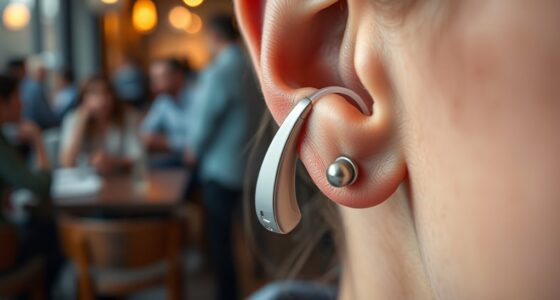If you’re looking for mental health resources for the deaf community, start by connecting with specialized providers experienced in ASL and deaf culture, such as those listed through NASADHH or the Laurent Clerc Center. Crisis hotlines like the National Deaf Domestic Violence Hotline and DeafLEAD offer immediate support via video or text. For ongoing care, online and outpatient programs tailored for deaf individuals are available, along with community groups and advocacy efforts that promote awareness and reduce stigma. Discover more options and tips to navigate mental health support effectively.
Key Takeaways
- Access specialized mental health providers experienced in ASL and deaf culture through directories like NASADHH and organizations such as Laurent Clerc Center.
- Utilize crisis hotlines offering videophone, video relay, or text services tailored for the deaf community, like DeafLEAD and the National Deaf Domestic Violence Hotline.
- Ensure communication accommodations, including qualified interpreters and visual aids, to promote effective, confidential mental health care.
- Connect with community organizations and support groups to foster open dialogue, reduce stigma, and share culturally appropriate resources.
- Explore online platforms offering educational materials, telehealth services, and peer support specifically designed for deaf individuals.
Finding Specialized Mental Health Providers for Deaf Individuals
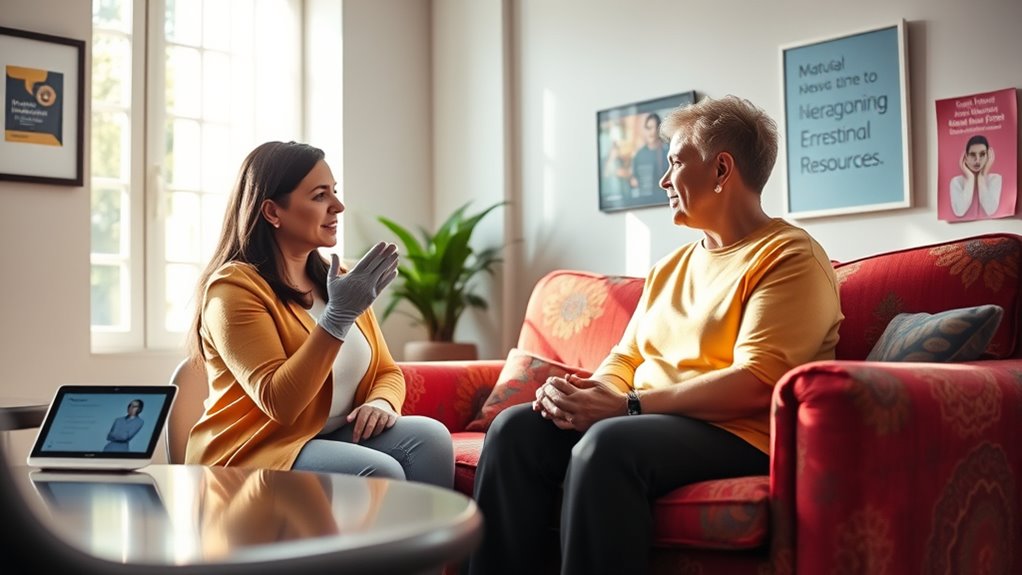
Finding the right mental health provider for a deaf individual can be straightforward if you know where to look. Start by contacting state agencies or visiting the NASADHH directory to find specialized providers experienced with deaf clients. Look for licensed mental health professionals who are knowledgeable in ASL and skilled in communication modes used by the deaf community. Use resources from organizations like the Laurent Clerc National Deaf Education Center or the Deaf Counseling Center to locate culturally competent providers. Verify that the provider can offer accommodations such as qualified interpreters, captioning, or video relay services to ensure effective communication. Many states also have online resources and programs connecting deaf individuals with mental health services that respect deaf culture and meet communication needs. Additionally, exploring best anime movies can provide engaging and comforting entertainment as part of overall mental wellness strategies. Recognizing the importance of culturally competent care ensures that mental health services are respectful and effective for deaf clients. Incorporating specialized communication methods into treatment plans can significantly improve therapeutic outcomes for deaf individuals. Being aware of accessible mental health resources can further help in finding appropriate support tailored to deaf individuals’ unique needs. For example, understanding various communication modes can help match clients with providers who can best meet their needs and preferences.
Immediate Crisis Support Hotlines for Deaf People
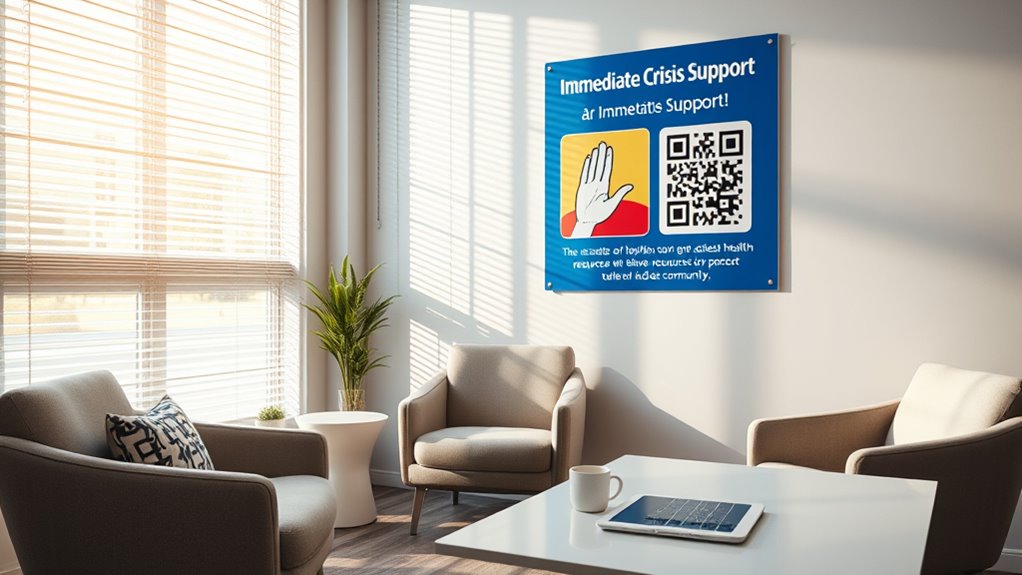
When you or someone you care about is in a mental health crisis, access to immediate support is crucial—especially for deaf individuals who rely on accessible communication. Hotlines like the National Deaf Domestic Violence Hotline provide 24/7 crisis support via videophone and email, ensuring urgent assistance tailored to the deaf community.
DeafLEAD offers a 24/7 crisis hotline through videophone and text-messaging, allowing you to connect quickly and easily. The Crisis Text Line supports deaf users by enabling confidential text-based crisis support at any time, using simple keywords like DEAF. Increasing mental health awareness within the deaf community can reduce stigma and encourage more individuals to seek help when necessary. Having accessible resources readily available can make a significant difference in emergency situations.
These hotlines partner with interpreters to deliver accessible voice call services, ensuring deaf individuals receive timely, effective mental health crisis support whenever needed. Promoting awareness of biodiversity and accessible mental health resources can help foster a more inclusive and supportive environment for all. Additionally, having accessible communication methods in crisis situations can significantly improve outcomes for deaf individuals in need. Recognizing the importance of specialized services can further enhance the quality of support provided during emergencies.
Supporting Families of Deaf Teens in Mental Health Care

Supporting your deaf teen’s mental health starts with establishing effective communication, like using sign language or visual tools. Connecting with support networks, such as community organizations or online groups, offers valuable guidance and shared experiences. Managing professional resources ensures your family gets culturally appropriate care and the right assistance when needed. Being aware of specific mental health resources for the deaf community can further improve access to specialized support. Recognizing the importance of accessible mental health services can help bridge gaps in care and ensure your teen’s needs are fully met. Understanding the unique needs of deaf individuals, including culturally sensitive mental health care, is essential for providing comprehensive support. Additionally, understanding the significance of communication accessibility can greatly enhance your teen’s comfort and engagement in mental health care. Staying informed about the effects of AI vulnerabilities on mental health resources can help ensure the safety and reliability of online support platforms for deaf teens.
Effective Communication Strategies
How can families guarantee effective communication with their deaf teens during mental health care? Start by ensuring access to qualified interpreters fluent in sign language, especially ASL, for all appointments. Use visual aids and written materials tailored to your teen’s preferred communication method to improve understanding. Learning basic sign language and understanding deaf culture helps create respectful, meaningful interactions. Incorporating technology like video relay services and captioned telehealth can boost accessibility. Here’s a quick overview:
| Strategy | Tools | Focus |
|---|---|---|
| Sign language | Learning basics | Communication |
| Interpreters | Qualified professionals | Mental health support |
| Visual aids | Charts, images | Understanding diagnosis |
| Technology | Video relay, captions | Accessibility |
| Cultural competence | Deaf community norms | Trust building |
Additionally, familiarizing yourself with deaf culture can enhance your understanding and foster a more supportive environment. Recognizing deaf community norms and values is essential for building trust and ensuring respectful communication in mental health settings. Developing a culturally competent approach can significantly improve the effectiveness of mental health care.
Connecting With Support Networks
Connecting with support networks is essential for families of deaf teens steering mental health care. These networks, including organizations like the National Deaf Center, help you access crucial mental health resources tailored for the deaf community.
They enable you to connect with professionals experienced in deaf mental health, helping you overcome communication barriers and develop effective strategies. Regular checks on statements can aid in identifying any mental health concerns early. Incorporating vibrational alignment techniques from the Law of Attraction can also enhance your family’s resilience and positive outlook during challenging times. Additionally, understanding specialized materials designed specifically for deaf individuals ensures that information is accessible and meaningful. Staying informed about AI in Education innovations can provide new tools for supporting your child’s learning and emotional growth. Exploring culturally responsive practices can further improve communication and trust within your family and community.
Support groups and community organizations offer tools for fostering open dialogue, resilience, and advocacy within your family.
Online resources provide educational materials and counseling options that respect your child’s cultural and linguistic needs.
Engaging with these resources empowers you to navigate mental health challenges confidently, ensuring your family receives the support and understanding necessary for your teen’s well-being.
Navigating Professional Resources
Finding the right mental health professional for your deaf teen can feel overwhelming, but knowing where to start makes the process much easier.
Look for deaf mental health professionals with experience working with deaf and hard-of-hearing clients, making certain they understand deaf culture and communication preferences.
Contact state agencies or organizations like the NASADHH directory to find specialized providers who can offer tailored mental health services.
Don’t forget to request communication accommodations, such as qualified interpreters or visual aids, to ensure confidential, accurate assessments.
Many organizations, like the National Deaf Center, provide valuable resources and guidance to help families navigate these services.
Connecting with community groups can also lead you to trusted providers experienced in supporting deaf teens’ mental health needs.
Additionally, considering craft and textiles resources might help in finding therapists who incorporate creative therapies suited for deaf adolescents.
Accessible Communication in Mental Health Services
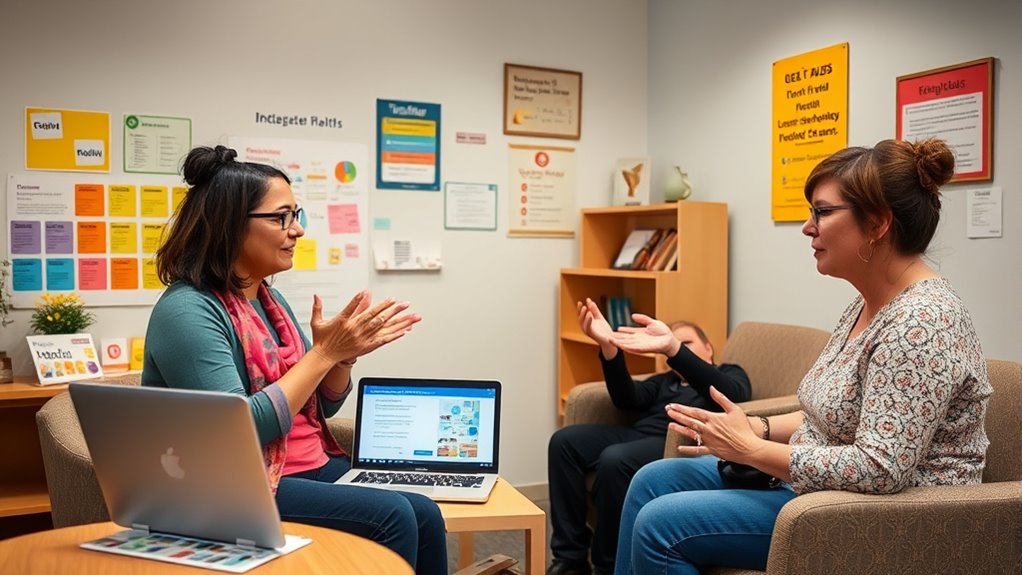
Accessible communication is essential in mental health services to guarantee you fully understand and feel safe during your sessions. Using qualified interpreters and offering different communication modes helps protect your confidentiality and supports accurate diagnosis.
When communication is clear and secure, you can focus on your recovery with confidence.
Qualified Interpreter Use
Using a qualified interpreter is essential for ensuring clear and accurate communication during mental health sessions with deaf clients. Qualified interpreters fluent in ASL play a vital role in bridging gaps between mental health providers and the deaf community.
These sign language interpreters help convey complex diagnoses, treatment plans, and medication instructions accurately, ensuring better health outcomes. Arranging for certified interpreters ahead of appointments prevents delays and promotes seamless access to care.
Maintaining confidentiality is crucial, and trained interpreters are committed to preserving your privacy and creating a safe environment for open discussion. The ADA requires mental health services to provide qualified interpreters, guaranteeing equal access and effective communication for all, which is fundamental to successful treatment and support.
Communication Mode Options
Effective communication methods are key to ensuring you receive the support you need during mental health services. You can use sign language or real-time captioning for accessible communication, making sessions clearer and more effective.
Many mental health professionals now offer remote counseling via video platforms that support sign language or provide interpreter services. Visual aids, written materials, and assistive listening devices help tailor communication to your needs.
Employing qualified interpreters during therapy preserves confidentiality and respects deaf culture, ensuring culturally appropriate care. Some organizations also train mental health providers in deaf culture and accessible communication techniques.
These options enable you to engage fully in your treatment, whether in person or remotely, and help bridge communication gaps for better mental health outcomes.
Confidentiality and Safety
How can you guarantee your mental health sessions remain confidential and safe when communication involves interpreters or technology? Ensuring confidentiality and safety starts with mental health providers using accessible communication tools like qualified interpreters or real-time captioning. These accommodations help protect your privacy and promote clear, direct communication.
Providers should follow strict privacy policies and utilize secure channels, especially during remote sessions, to prevent data breaches. Using trained interpreters minimizes misunderstandings and ensures sensitive information stays confidential.
Additionally, mental health providers must create an environment where you feel safe sharing your concerns, knowing your communication preferences are respected. By prioritizing confidentiality and safety through proper accommodations and secure communication practices, you can trust that your mental health journey remains private and protected.
Types of Mental Health Professionals and Their Roles
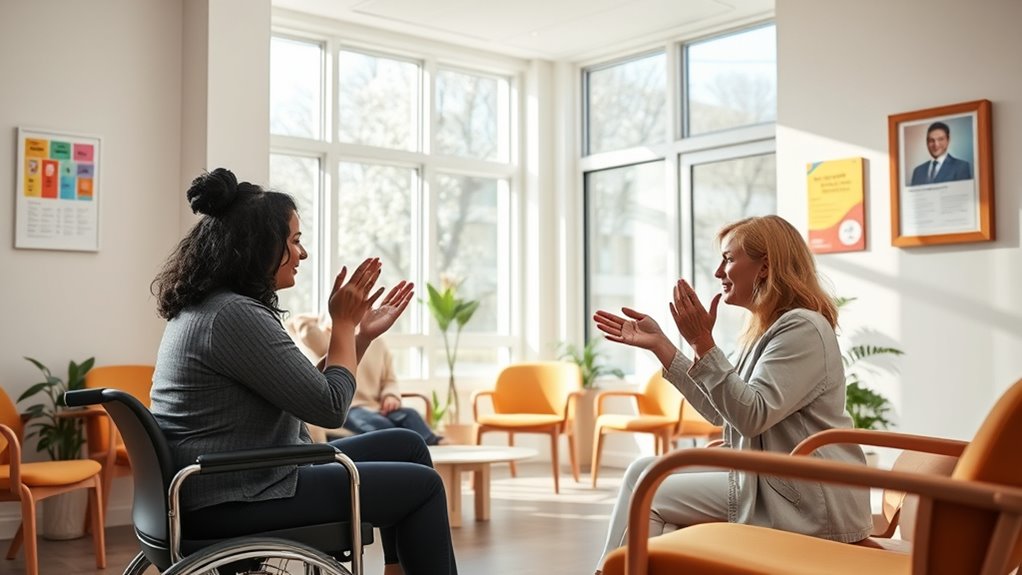
There are several types of mental health professionals who can support the deaf community, each with specific roles and expertise. Psychiatrists are licensed medical doctors who diagnose mental health disorders and prescribe medication as needed.
Mental health professionals support the deaf community with specialized roles and expertise.
Licensed counselors and therapists provide talk therapy and counseling tailored to individual needs. Social workers and psychologists conduct assessments, develop intervention plans, and offer ongoing support.
Many professionals working with the deaf community are trained in sign language or use qualified interpreters to guarantee effective communication. All these professionals operate under strict confidentiality and prioritize cultural competence to respect deaf clients’ unique experiences.
Whether through therapy, assessment, or support, each plays a crucial role in helping you access mental health care that respects your communication needs and cultural background.
Rights and Resources for Deaf Individuals Seeking Help
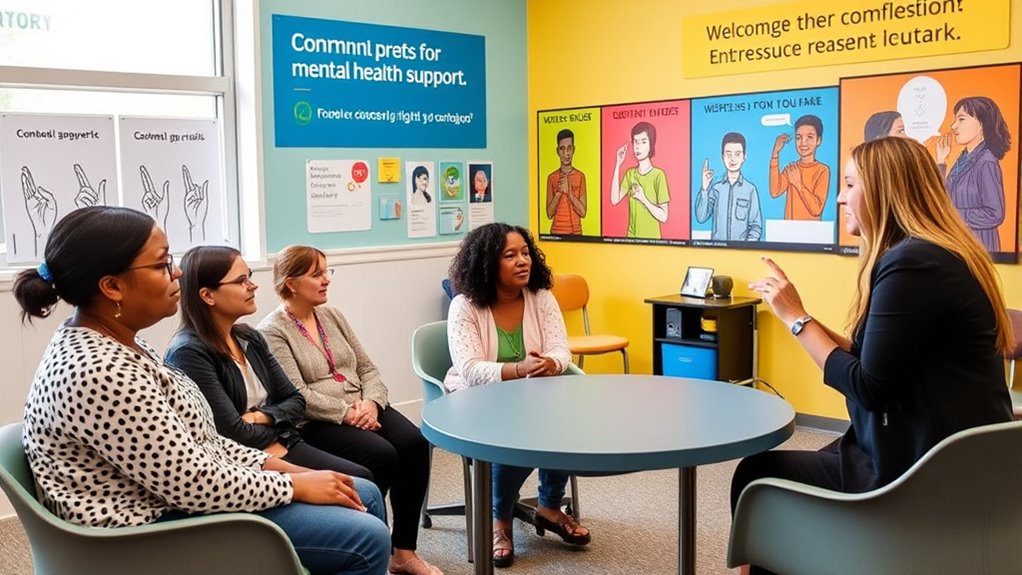
Deaf individuals have the right to accessible mental health services, including the use of qualified interpreters and accommodations that guarantee effective communication. You can request trained interpreters or ASL-fluent providers to make sure your needs are met. Organizations like NASADHH and Laurent Clerc Center help locate culturally competent mental health professionals. The ADA mandates that facilities provide accessible communication options, protecting your Deaf rights. Crisis support is available 24/7 through hotlines like the National Deaf Hotline and DeafLEAD, offering support via videophone or text. Advocacy plays a key role in making certain your rights are respected, and discrimination can be challenged. Use this table to understand your options for accessing mental health services and support:
| Resource/Right | How It Helps |
|---|---|
| Qualified interpreters | Ensures effective communication |
| Accessibility laws | Protects your rights under ADA |
| Crisis hotlines | Immediate support when needed |
| Advocacy groups | Assist in navigating services |
Promoting Mental Health Awareness in the Deaf Community
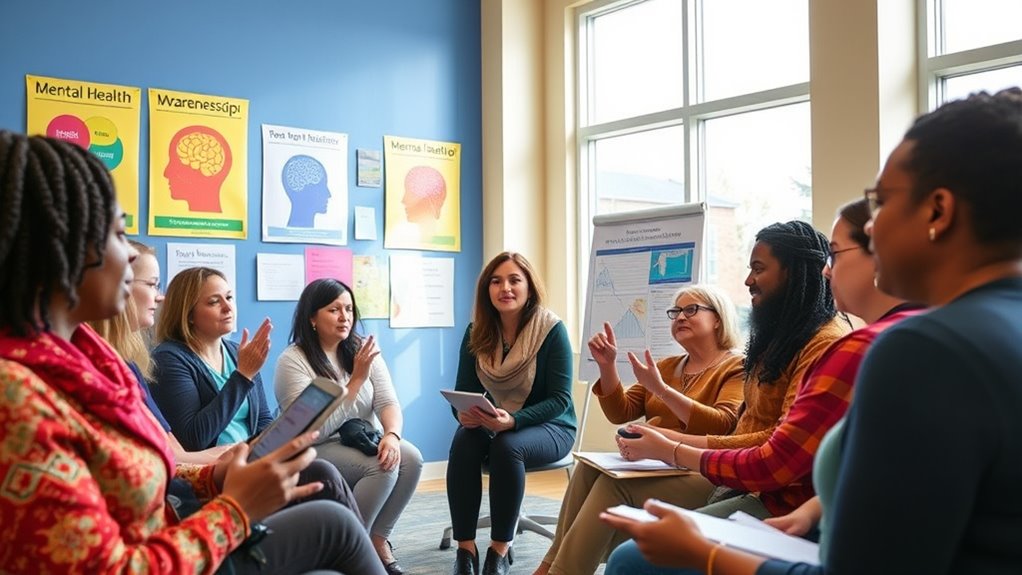
Raising mental health awareness within the deaf community is essential for reducing stigma and encouraging individuals to seek support.
By promoting mental health awareness through community-led initiatives, you help normalize conversations about mental health in ASL, making it more accessible. Sign language resources enable better communication and connect you with culturally competent care providers who understand your unique needs.
These efforts emphasize early intervention, which can prevent more serious issues. Deaf advocacy groups work alongside organizations like the National Deaf Center to develop education campaigns that challenge mental health stigma.
When you increase awareness, you empower the deaf community to prioritize mental well-being and access appropriate support.
Ultimately, fostering a culture of openness and understanding encourages more deaf individuals to seek help without fear or hesitation.
Online and Outpatient Mental Health Programs for Deaf People

Accessing mental health care is more feasible than ever for Deaf individuals thanks to specialized online and outpatient programs. These programs offer culturally sensitive mental health services, including case management and dual diagnosis care tailored for Deaf clients.
Telehealth options from organizations like the Center for Family Services enable you to connect with ASL-fluent professionals remotely, making treatment accessible from home.
Maryland’s Deaf Addiction Services provides dual-diagnosis outpatient care specifically designed for Deaf and hard-of-hearing individuals, with sign language interpretation included.
Bridgemark Addiction Recovery Services creates personalized outpatient recovery plans for Deaf people.
Online platforms such as DODA Meetings and Deaf Sober Group facilitate accessible recovery meetings in ASL or with interpretation, supporting ongoing mental health and substance use recovery for the Deaf community.
Self-Care Strategies for Maintaining Mental Well-Being
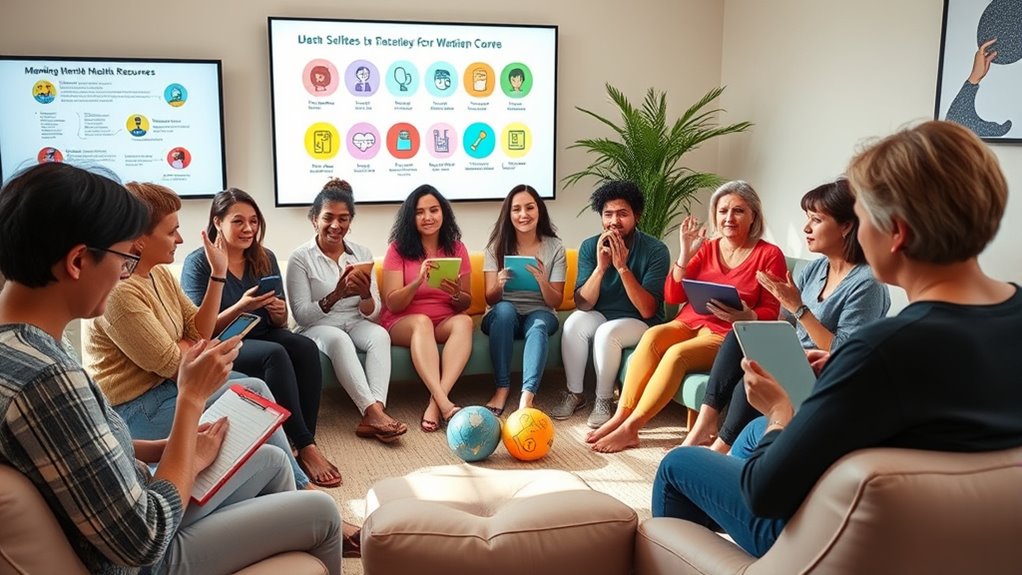
Building a strong self-care routine can considerably support your mental well-being. Prioritize regular sleep, nutritious meals, and physical activity to boost your mental health.
Engaging in adapted activities like mindfulness or meditation, tailored for visual or ASL-based instructions, helps with stress reduction.
Connecting with community support—whether online or in person—fosters emotional resilience and combats feelings of isolation common in the deaf community.
Practicing positive self-talk and setting realistic goals can lift your self-esteem and manage anxiety or depression symptoms.
Remember, personalized strategies are key; find self-care practices that fit your needs and preferences.
Consistent self-care not only enhances your mental health but also empowers you to navigate challenges with greater confidence.
Overcoming Stigma and Improving Deaf Mental Health Access
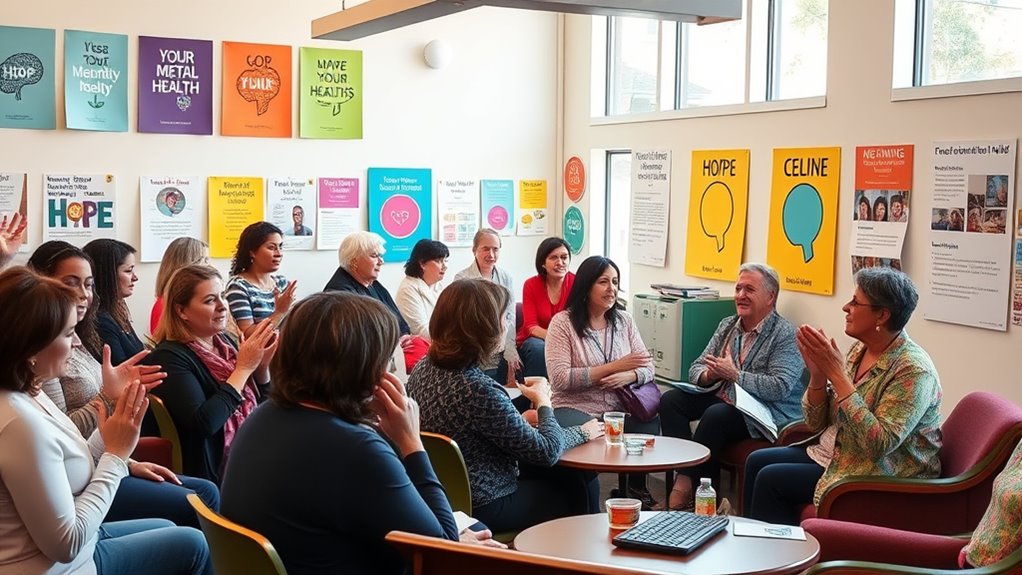
You can help break down cultural barriers that discourage mental health care by promoting open conversations and understanding.
Ensuring communication access through sign language interpreters and culturally competent providers builds trust and encourages help-seeking.
Supporting community empowerment allows deaf individuals to share their stories, challenge stigma, and foster a more supportive environment.
Reducing Cultural Barriers
How can we effectively reduce cultural barriers that prevent the deaf community from seeking mental health support?
By increasing awareness campaigns tailored to the deaf community, you can help dispel misconceptions and normalize mental health conversations. Improving mental health access involves providing culturally accessible care, such as sign language services and communication accommodations, which build trust and engagement.
Community support networks and online resources also play a crucial role in bridging cultural gaps and fostering a sense of belonging.
Stigma reduction is essential; when you promote open dialogue and share success stories, you help diminish negative perceptions.
Ultimately, creating an environment where deaf individuals feel understood and respected encourages them to seek the help they need without fear or hesitation.
Promoting Communication Access
Promoting communication access directly addresses the cultural barriers that hinder deaf individuals from seeking mental health support. By providing qualified ASL interpreters and assistive technologies, you guarantee effective mental health interactions.
This approach encourages stigma reduction and opens dialogue within the deaf community. To improve accessible communication, consider these strategies:
- Offer training for mental health providers on deaf cultural competency
- Increase awareness through culturally sensitive education
- Create safe, judgment-free environments for sharing experiences
- Expand online resources with accessible communication options
- Promote the use of assistive technologies to overcome barriers
These efforts help normalize mental health conversations, foster trust, and broaden access to mental health support for deaf individuals.
Enhancing communication access ultimately empowers the deaf community to seek the help they need.
Supporting Community Empowerment
What strategies can effectively empower the deaf community to overcome stigma and improve access to mental health care? Raising mental health awareness and challenging stereotypes within the deaf community are essential for stigma reduction. Promoting community-led initiatives encourages open dialogue, helping members discuss mental health without fear.
Providing accessible resources like sign language interpreters and assistive devices ensures you can seek appropriate mental health support. Peer support plays a critical role in fostering understanding and shared experiences, reinforcing community empowerment.
Sharing personal stories through social media can normalize mental health conversations and break down barriers. Educating both community members and professionals about deaf mental health needs empowers everyone involved, making mental health care more accessible and reducing stigma-related obstacles.
Frequently Asked Questions
What Is the 90% Rule in Deaf Culture?
The 90% rule in Deaf culture means that if at least 90% of communication within a group is in sign language, it’s considered a true Deaf environment.
You experience stronger cultural connections and mutual understanding when this threshold is maintained.
This rule helps guarantee authentic Deaf spaces, where shared language and culture foster a sense of community, identity, and belonging.
It emphasizes the importance of linguistic and cultural immersion.
How Is Mental Health Affected Within the Deaf Community?
Imagine mental health as a delicate plant struggling to grow in a barren, rocky landscape—that’s how it feels for you in the Deaf community. Communication barriers, limited access to culturally appropriate services, and social isolation act like harsh winds, stunting growth.
You’re more prone to depression and anxiety because of these obstacles, making it harder to seek help. Without proper support, your mental health remains vulnerable, like a fragile bloom in a storm.
What Services Does NAD Provide?
You’ll find that the NAD offers valuable services to support the deaf community. They advocate for better access to mental health care, sharing policy guidance with government agencies.
You can access their directory of deaf-friendly mental health providers, making it easier to locate appropriate support. They also provide educational materials and training to guarantee services are culturally and linguistically appropriate.
Plus, NAD offers support if you face discrimination or barriers in mental health care.
What Organization Promotes the Rights of Deaf People?
You might want to know which organization promotes the rights of deaf people. The National Association of the Deaf (NAD) is dedicated to advocating for your rights.
They work to guarantee you have access to quality services, eliminate discrimination, and improve communication in various settings.
NAD also collaborates with government agencies, develops policies, and provides resources to empower you to assert your rights and receive fair treatment.
Conclusion
Remember, accessing mental health resources for the deaf community is essential—don’t wait for a knight in shining armor. By seeking specialized providers and promoting awareness, you can break down barriers and foster understanding. Whether you’re supporting a loved one or yourself, taking action now can make a difference. As the wise saying goes, “A stitch in time saves nine,” so prioritize mental well-being today and help create a more accessible, compassionate future for all.




